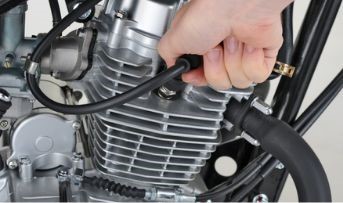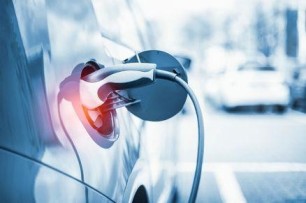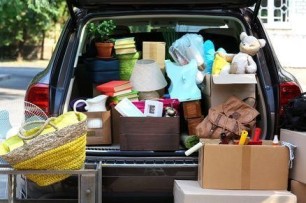General Insurance Blogs, Articles & Updates by - Magma Insurance
Have us call you
- RENEW YOUR POLICY
- BUY NEW POLICY

Check out these things if your two-wheeler fails to start
We can all agree that having difficulties starting a motorcycle is an unpleasant experience. Even though motorcycles are relatively basic machines, it can be challenging to identify the problem preventing them from starting.
Before starting up, the first task, which is sometimes overlooked, is to bring your bike to an open place. Your bike's startup process will depend on how long it has been standing, which may result in smoke. It is advisable to wait till the thermostat turns on the radiator fan before starting the engine. Let your air-cooled motorcycle run until you can feel the warmth emanating from the engine.
Let's examine any issues you might have with your two-wheeler failing to start.
1. Defective or dead battery:
The bike's electrical system depends on the securely mounted battery. When a twowheeler has just an electric start, the battery is the only power source for the starter motor. The motor, which requires a high voltage from the battery, can only be started if the battery has enough charge.
2. Blown-out fuses:
Blown fuses will make the motorcycle sound normal when you try to start it, but it will spin endlessly without producing any power. Even if you try to spray starter fluid into the carburetor, nothing will change since the fuse cannot send a spark to the spark plug, causing it to ignite. A blown-out fuse typically indicates a defective grounding wire somewhere.
3. Preventing the intake or exhaust:
A situation that causes starting problems is a blocked airbox or muffler exit, which can happen for any reason. Therefore, you should also check your bike's intake and exhaust systems to see whether they contain anything unwanted blocking their way.
4. Put the side stand up:
A few newer bikes may not start when the side stand is down. Your motorcycle may contain an internal code and other sophisticated sensors that prevent the ignition from turning on if the kickstand is in place.
Check to see if your bike has a side stand sensor and if it does, and the bike still won't start, examine if the switch down there is in good working order. If it's not, the bike side stand sensor might have a fault. Get this problem checked at an authorised service centre.
5. Injector clogged:
A clogged injector will attempt to turn over normally when you try to start your motorcycle, but there won't be any combustion. A clogged fuel injector is likely to blame if you are certain that the spark is occurring properly, there is gas in the tank, but still, your bike isn't starting. Fuel injectors should be checked regularly. They should be cleaned or replaced if they appear soiled and clogged.
6. Defective spark plug wire:
Motorcycle riders are accustomed to loose spark plug wires, which might happen due to jerks. To solve this issue, you don't need to visit a mechanic. Unplug and replug the connectors before starting the motorcycle again.
7. Not properly engaging the clutch:
When starting your motorcycle and the transmission is in gear, you must pull the clutch lever correctly. The clutch occasionally fails to engage properly and causes a starting issue. Put your transmission in neutral and try again in this situation.
Checking a few things off your pre-trip list helps you overcome the ignition issue of your motorcycle. Other times, a thorough overhauling is required before you get stuck on the road, in which case you must seek professional assistance. Following these procedures will help you identify the issue and arrange for the necessary repairs. Additionally, it is prudent to have 2 wheeler insurance online to acquire comprehensive coverage for damages to your bike and be stress-free regarding its repair and maintenance expenses
Click HERE to buy 2 wheeler insurance online.
Disclaimer: The information provided above is for illustrative purposes only. To get more details, please refer to policy wordings and prospectus before purchasing a policy.

Let's discuss how you can increase the range of your electric vehicle
Electric vehicles are all the rage right now. India will significantly switch from fuel-based to electric-based vehicles in the upcoming years. Countries like the USA have seen a significant chunk of their population switch to electric cars. Even in India, people drive electric scooters in metropolitan cities. Like every other vehicle, electric vehicles also require maintenance. Plus, you would need to ensure that you make the energy of your electric vehicle efficient and increase the capacity of the engines to give your vehicle a prolonged life.
Now, let's discuss the techniques and tips that can increase the range of your electric vehicle. Doing this will help you improve your car's battery life in the long run. So, let's get started.
1. Drive properly:
Sudden jerks and an increase in acceleration can adversely affect your battery as the increment would put pressure and end up draining the battery. Experimenting with your vehicle's torques and testing the high speeds sure seem very lucrative, but it will impact your battery negatively over time. You also need to ensure that you drive smoothly and operate your vehicle carefully to increase the battery's longevity and the overall functioning of your two-wheeler or fourwheeler.
2. Go easy on the air conditioners:
The usage of air-conditioners does impact the battery. Prolonged use of air conditioning depletes the battery power at a fast rate. But there are places and times when you cannot live without the air conditioner. How do you go about this issue? You can switch on the fan instead of amping up the compressor. This will help you conserve power and regulate the cool air inside the car. You can open the windows, but this slightly affects the car's aerodynamics, functioning, and operations.
3. Be careful on those brakes:
Your electric vehicle's regenerative braking helps you recover the energy lost during the sudden braking process. So, use that whenever there is a necessity for brakes. And make sure to avoid unnecessary braking as it stresses the battery into bringing the vehicle to a halt or lowering the speed out of the blue. So, take it a little easy on the brakes whenever you are driving. Also, ensure that you use the maximum regenerative setting of your car during the deceleration process. This option will help conserve all the extra power by directing it back to the battery and increasing its life.
4. Be mindful about charging your vehicle:
It would be best if you carefully charge your electric vehicle. Keeping it plugged in all the time while your car is idle in the garage is of no use. Instead, it will negatively affect the battery as it starts to self-discharge once it gets fully charged. Timing the charging of your electric vehicle's battery helps you to attain those few miles once your vehicle is fully charged and plugged out at the right time. Timing the battery charge also helps conserve electricity and increases your battery's longevity. So, it's easier on the pocket and the environment.
Some other ways to increase the range of your electric vehicle include figuring out an efficient route to your destination, packing and travelling light, keeping your tyres in check, etc.
Unprecedented circumstances indicate the level of uncertainties around our lives and possessions and how we must be careful and take mandatory steps to prepare for these situations in advance.
This is why you need to purchase motor insurance from the best motor insurance company to safeguard your vehicle in times of distress. Explore your options carefully and buy insurance from the motor insurance company, which promises to cater to your needs in the best ways possible.
Click HERE to know more about the insurance benefits provided by the best motor insurance company.
Disclaimer: The information provided above is for illustrative purposes only. To get more details, please refer to policy wordings and prospectus before purchasing a policy.

Can you buy two-wheeler insurance without inspection
As per the Motor Vehicles Act, every vehicle owner in India is legally required to purchase insurance. It is a compulsory prerequisite that serves as a preventive mechanism to protect the owner from losses from accidents and damage to the bike. Despite the mandate, many two-wheeler owners shy away from purchasing a policy due to the lengthy process and inspection.
While it may seem like an additional step in the process, inspection is an essential part of the conventional insurance procedure that makes the insurer fully aware of the bike’s condition before accepting to insure it. However, two wheeler insurance online India has become a popular and convenient alternative that facilitates comparison between different policies and allows one to skip the inspection altogether.
Why is an inspection necessary?
Buying an insurance policy is a prudent move on the owner’s behalf. It protects them from any financial losses due to accidents or damages. However, insurance companies also require comprehensive information about the insured vehicle. A physical inspection helps identify the present state of the two-wheeler and whether it complies with Government issued legal guidelines.
The process scrutinises the physical condition of your bike and its documents like PUC certificate, service records, etc., to prevent insurance fraud. This helps the insurer gauge its value and expected life, which helps determine whether they should insure your vehicle and the premium amount.
The inspection may also discover unnoticed issues with your vehicle that you can resolve before it leads to an accident.
Is inspection before insurance mandatory?
Although important, inspection is not a mandatory process. If you buy two wheeler insurance online India, you can skip the inspection by providing basic details of your twowheeler on your preferred insurance company’s website. Usually, it takes a little while postapplication for them to send your bike insurance policy.
Requisites for an inspection-less insurance.
When applying for two wheeler insurance online India, you may notice that different insurance providers have different procedures. While some may use factors like brand, period of use, model, etc., others may only ask for registration details. Typically, the process involves declaring details such as:
● Period of use
● Place of registration
● Record of previous claims
● PUC certificate
● Vehicle registration number
● Maintenance records
● Previous policy details
Circumstances when an inspection is unavoidable.
While two wheeler insurance online India is convenient, requires minimal effort, and eliminates the need for inspection, in some situations, it is inevitable to go through a check, such as
● When your previous policy lapses:
2-wheeler owners need to renew their insurance before the policy lapses or the 30- day grace period expires. During this time, when the vehicle is not insured, accidents or damages may have gone unrecognised, due to which insurers compulsorily inspect the vehicle before approving its insurance.
● When modifications are made:
Ideally, the vehicle should be left untouched without any aftermarket modification to its factory-fitted components. When modified, it becomes necessary to inspect the 2-wheeler to ensure that the additions do not adversely affect the basic functionality of the bike, which can lead to mishaps in the long run.
● When the 2-wheeler is second-hand:
Second-hand vehicles, while being cheap, are essentially weathered vehicles. They possess greater risk than new bikes and therefore need to be inspected after the ownership is transferred before altering the existing policy or purchasing new insurance.
● When the 2-wheeler has been in a recent accident:
For vehicles that have recently been in an accident, it becomes necessary to survey the extent of damage to determine its cost of repairs, current value, and insurable value.
Two wheeler insurance online India is a hassle-free way of protecting your 2-wheeler without having to go through an inspection. By following the general guidelines for safe driving and renewing your policy in time, you can easily avoid the inspection procedure
Click HERE to purchase two wheeler insurance online India.
Disclaimer: The information provided above is for illustrative purposes only. To get more details, please refer to policy wordings and prospectus before purchasing a policy.

Let’s understand why overloading a car is never a good idea
There are many instances when people overload their cars. It might be a fun road trip, a once-in-a-lifetime hike, or helping a relative or friend move. From clothes, shoes, and other accessories to the amenities like bicycles, coolers, mattresses, and more, it seems necessary to pack our whole house up before leaving for a road trip.
Similarly, when moving or helping a friend move, you try to take more and more stuff on one trip to reduce the number of rounds taken, often leading to overloading your car unnecessarily. This may result in car accidents and injuries, sometimes fatal for the passengers.
This blog tries to give you an argument against overloading your vehicle in the future.
1. Stress on the suspension:
When steering an overloaded vehicle, there's a high possibility of the weakest point giving out, thus resulting in a crash that endangers the passenger's lives and those with them on the road. It becomes increasingly difficult to steer the car in the right direction and turn safely on bends due to overloading. Your vehicle might face serious suspension issues, resulting in an unpleasant driving experience, especially on bad roads.
2. Instability:
Every vehicle is unique in how it reacts to excess weight. However, most vehicles become highly unstable as a result of excess weight. It becomes difficult to steer, and the stopping distance increases drastically, which can hamper the smooth running of your car. Sudden steering or manoeuvring is highly discouraged when a car is overloaded because it can result in a spinout.
3. Chance of blowing a tyre:
One of the biggest concerns while driving an overloaded car is that the tyres heat and blow up when they come across high degrees of pressure. There are increased chances of bursting, and at the very least, there will be increased wear and tear on the tyres, bringing maintenance issues.
4. Penalties:
You might be fined solely for the safety and well-being of fellow drivers and vehicles. After increased accidents in India due to overloading, stringent laws are being applied all across the country, and hefty fines are being imposed.
5. Compromised safety:
With an increased number of people and items in the car, it is improbable that any of the passengers will be able to put their seatbelts on. This is highly dangerous and can result in the compromised safety of everyone in the vehicle, especially if the car meets an accident.
6. Harder to apply brakes:
Brakes will take longer to stop an overloaded vehicle than a regular vehicle. This, in turn, makes it harder for the driver to react in case of emergencies and makes it highly unsafe for passengers due to the possibility of car crashes
7. Acceleration loss:
Acceleration is highly compromised when a car is burdened beyond its carrying capacity. It makes it harder for these cars to move smoothly between vehicles on a busy road, which can result in mishaps.
8. Reduced visibility:
Your rear vision will be impaired if items are packed on top of each other in the backseat. This reduces driver control and can lead to hefty fines if caught. Also, the cramped space that comes with riding with so many passengers aboard can severely hamper driver control.
9. More petrol consumption:
The engine demands more consumption of petrol to generate the power to drive the load in the car. While this may not seem like a high cost, it adds up to be a lump sum with time.
10. Discomfort:
Driving with such heavy equipment increases discomfort, and there's a high probability of a heavy object hitting your head if you apply the brakes too hard.
Although insurance rarely covers damages resulting from overloading a vehicle, it's best to research the best car insurance in India to be safe from heavy expenses if your car faces damages due to an accident. We advise you to avoid overloading your car in any case. It is not worth damaging your valuable asset and putting your life at risk for saving time and stuffing your car with excessive items. Safety should be your top priority. Therefore adapt to healthy driving practices to keep yourself protected throughout your journey.
Click HERE to know more about the best car insurance in India.
Disclaimer: The information provided above is for illustrative purposes only. To get more details, please refer to policy wordings and prospectus before purchasing a policy.

